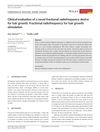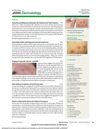Search
for
Sort by
Research
120-150 / 1000+ results
research Platelet Rich Plasma in Androgenetic Alopecia: A Prospective Study
Platelet Rich Plasma (PRP) treatment effectively reduces hair fall and increases hair growth in patients with Androgenetic Alopecia (AGA), but it may cause pain.

research Androgenetic Alopecia in Adolescents
Topical minoxidil helps treat hair loss in teens, but more research needed for safe options.

research A Comparison of the Hormonal Profile of Early Androgenetic Alopecia in Men With the Phenotypic Equivalent of Polycystic Ovarian Syndrome in Women
Men with early hair loss have similar hormone levels to women with PCOS, possibly increasing risk of obesity and heart issues.

research Evaluation of the Effect of Injection of Dutasteride as a Mesotherapeutic Tool in the Treatment of Androgenetic Alopecia in Males
Dutasteride mesotherapy helps treat male hair loss but may harm sperm and sexual function.

research Clinical Evaluation of a Novel Fractional Radiofrequency Device for Hair Growth: Fractional Radiofrequency for Hair Growth Stimulation
The HairLux device safely and effectively promotes hair growth in people with hair loss.

research A Randomized, Single-Blinded, Vehicle-Controlled Study of a Topical Active Blend in the Treatment of Androgenetic Alopecia
Redenyl lotion effectively promotes hair growth and improves quality of life for androgenetic alopecia patients.

research Age, What Age, How Old? A Study on Androgenetic Alopecia Progression in Men Over 5 Years with Placebo Treatment
Untreated androgenetic alopecia leads to progressive hair loss in men.

research Highlights
Melanoma patients can learn to check their skin, early balding in men may indicate similar risks as PCOS in women, certain criteria can help predict skin cancer behavior, small skin cancer may not need extra therapy after surgery, and sterile gloves don't reduce infection in minor surgeries.

research Androgenetic Alopecia and Microinflammation
Inflammation may be linked to hair loss, and targeting specific enzymes could help treat it.

research Association of Androgenetic Alopecia With Smoking and Its Prevalence Among Asian Men
Smoking linked to hair loss in Asian men.

research Androgenetic Alopecia: An Update
Minoxidil and finasteride effectively treat hair loss.

research TrichoScan: A Novel Tool for the Analysis of Hair Growth In Vivo
TrichoScan is a reliable method for measuring hair growth and is useful for assessing hair loss treatments.

research Is Androgenetic Alopecia a Photoaggravated Dermatosis?
Sunlight worsens hair loss; protect scalp.

research Therapeutic Experience with Oral Finasteride for Androgenetic Alopecia in Female-to-Male Transgender Patients
Finasteride effectively treats hair loss in transgender men with few side effects.

research Finasteride, a Type 2 5α-Reductase Inhibitor, in the Treatment of Men with Androgenetic Alopecia
Finasteride effectively treats male hair loss, improving growth and density.

research Beyond Goosebumps: Does the Arrector Pili Muscle Have a Role in Hair Loss?
The arrector pili muscle might play a role in hair loss and needs more research to understand its impact.

research Evaluation of Androgen Receptor Gene as a Candidate Gene in Female Androgenetic Alopecia
AR gene not major factor in female hair loss; different from male hair loss.

research Clinical Updates in Hair
Most treatments for hair loss in 1997 were not effective for most people, and maintaining hair growth was difficult.

research Effectiveness and Safety of Botulinum Toxin Type A in the Treatment of Androgenetic Alopecia
BTA safely and effectively treats hair loss, and works better with FNS.

research Experimental and Early Investigational Drugs for Androgenetic Alopecia
New hair loss treatments may include topical medications, injections, and improved transplant methods.

research Cross-Sectional Quality of Life Assessment in Patients with Androgenetic Alopecia
Hair loss lowers quality of life, causing embarrassment, frustration, and sexual rejection.

research Progressive Expression of PPARGC1α Is Associated with Hair Miniaturization in Androgenetic Alopecia
Increased PPARGC1α relates to hair thinning in common baldness.

research The Effects of Smoking on Hair Health: A Systematic Review
Smoking is linked to more hair loss and premature graying compared to nonsmokers.

research Trichoscopic Evaluation of Frontal Hairline Recession in Egyptian Female Patients
Trichoscopy helps diagnose hairline recession causes in Egyptian women, with androgenetic alopecia being the most common.

research Utility of Horizontal Sections of Scalp Biopsies in Differentiating Between Androgenetic Alopecia and Alopecia Areata
Scalp biopsies help tell apart androgenetic alopecia and alopecia areata.

research Female Androgenetic Alopecia and Cardiovascular Risk
Women with hair loss have higher heart disease risk and unhealthy cholesterol levels.

research Antiandrogens and Androgen Inhibitors in Dermatologic Treatments
Antiandrogens and androgen inhibitors like spironolactone, finasteride, and dutasteride can treat hair loss and skin conditions, but they have risks and side effects, including potential harm to pregnant women and risks of cancer and heart issues. Herbal remedies also have antiandrogenic effects but lack safety validation.

research Hair Restoration: An Overview of Anatomy, Causes, and Treatments
The document concludes that there are various causes and treatments for hair loss, with hair transplantation being a notable option.

research Hair Loss
Some alternative treatments may help with hair loss, but more evidence is needed to confirm their effectiveness.